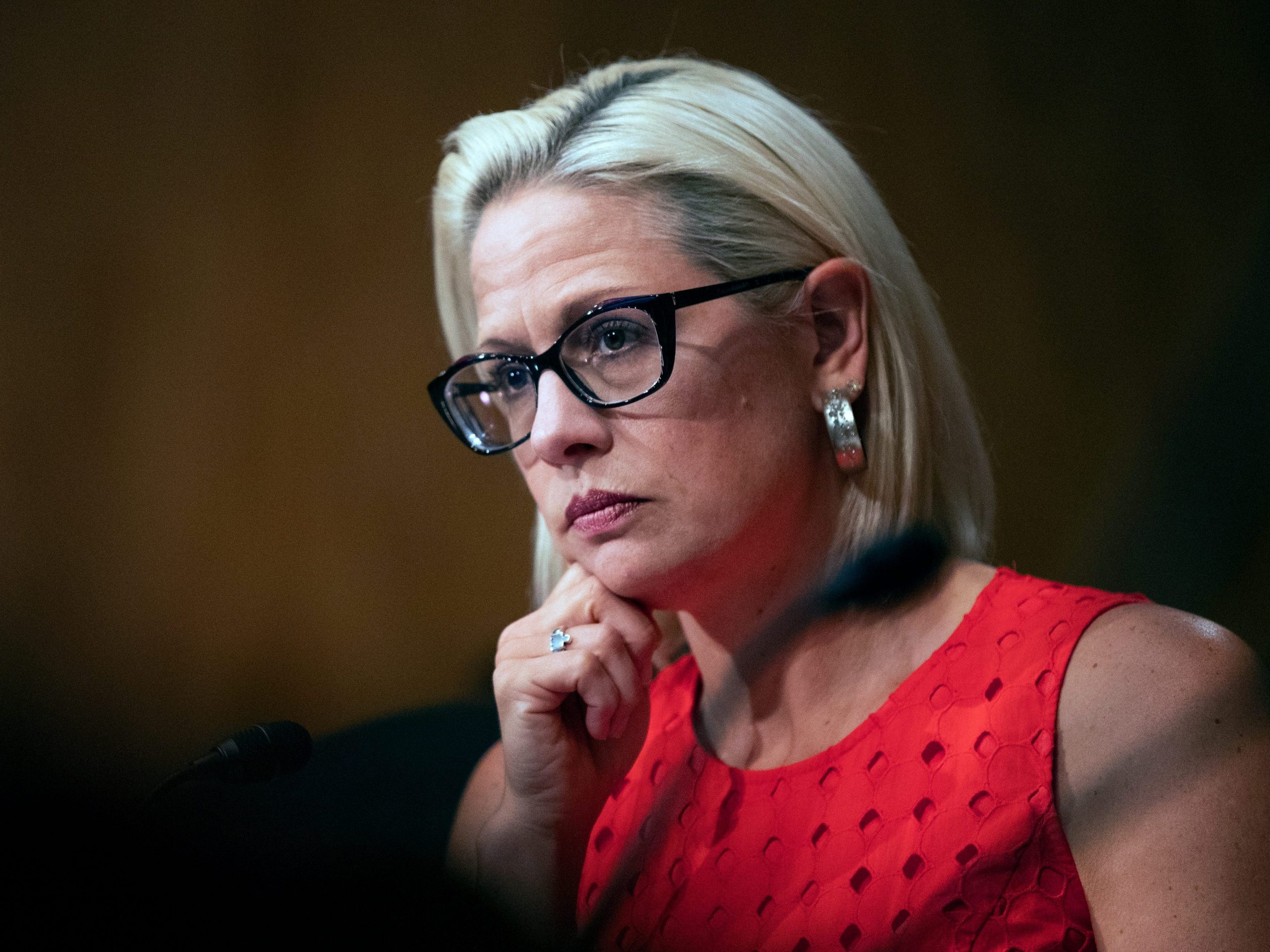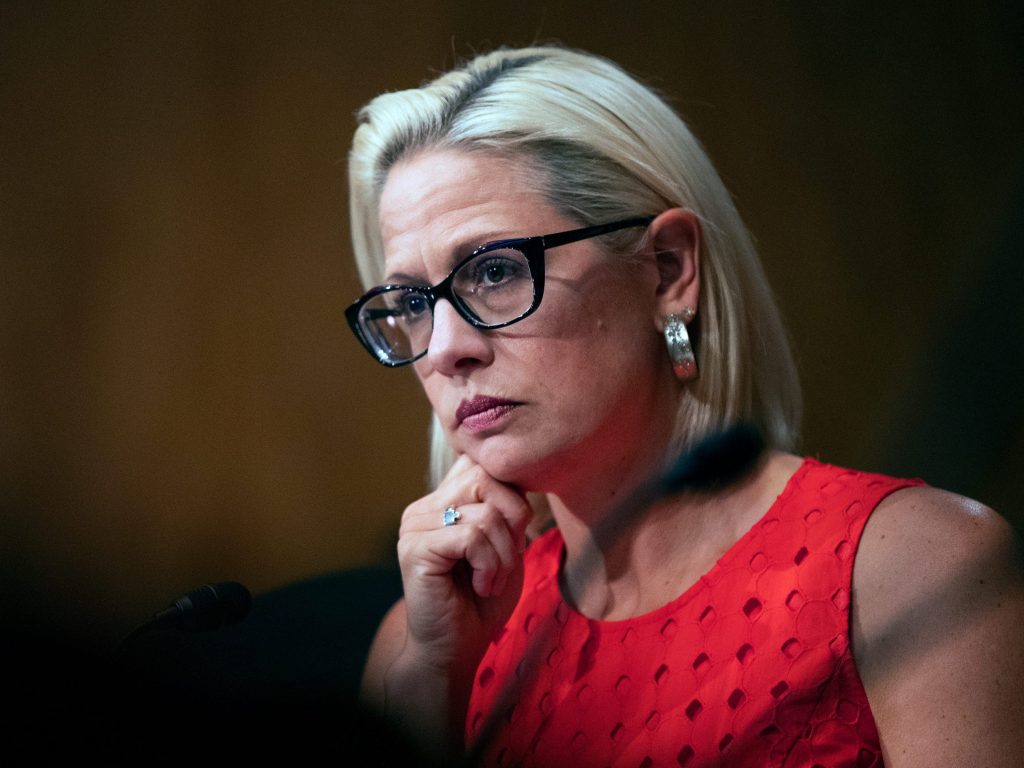
AP Photo/Manuel Balce Ceneta
- Kyrsten Sinema's campaign has received $500,000+ in campaign donations from the pharma industry.
- The $3.5 trillion spending bill would save the US "hundreds of billions" on health care spending.
- The biotechnology company Amgen gave Sinema $25,500 and is one of her largest financial backers.
- See more stories on Insider's business page.
Sen. Kyrsten Sinema of Arizona is said to be opposed to the current prescription drug pricing proposals in bills put forth by both the House and Senate, as well as an alternative from House centrists that would limit the drugs subject to Medicare negotiation, according to unnamed sources cited by Politico.
Sinema's stance has stalled the passage of the $3.5 trillion spending bill crafted by the Biden administration and fellow Democrats, even though it could jeopardize her own bipartisan infrastructure bill. Democratic Rep. Pramila Jayapal of Washington has previously said the majority of the Congressional Progressive Caucus, which she chairs, would not vote for Sinema's infrastructure bill without first passing the spending package.
If passed, the $3.5 trillion spending bill would lower the cost of certain prescription drugs by instituting reforms and allowing Medicare to negotiate prices, which would save the federal government "hundreds of billions" on health care spending, according to a memo for Democratic senators.
Sinema is a "pharma favorite in Congress"
Since launching her political career, Sinema's campaign committee has received more than $500,000 in donations from the pharmaceutical and health product industries, according to OpenSecrets.
Kaiser Health News dubbed Sinema a "pharma favorite in Congress" after her campaign received $98,500 from PACs run by employees of drug companies and their trade groups during the 2019-20 election cycle.
One of her largest financial backers has been Amgen, a biotechnology company that manufactures prescription drugs for individuals with illnesses that have limited treatment options, such as cancer patients and chronically ill individuals.
Insider reached out to Sinema and her team but has not received a response.
Many prescription drugs made by Amgen have hefty price tags. Overall, the company made $24.24 billion in global product sales in 2020.
Amgen did not respond to inquiries about whether it lobbied Sinema on prescription drug pricing reforms or how the bill's passage would impact the company's bottom line. In 2021, Amgen has spent $4.72 million on lobbying Congressional representatives over 17 bills, the majority of which address issues related to prescription drug pricing, according to OpenSecrets.
A super PAC with pharmaceutical industry ties funded a recent Sinema ad
According to Google's Transparency Report, a September 9 political ad for Sinema was paid for by Center Forward, a super PAC dedicated to supporting the election of centrist Democrats, according to The Washington Post.
In its registration with the Washington, DC, Department of Consumer and Regulatory Affairs, Center Forward lists Libby Greer and Cindy Brown from the lobbying firm Forbes Tate Partners as governors on its board. Greer and Brown are lobbyists for several pharmaceutical companies, including Bayer, Gilead Sciences, Eli Lilly, Novartis, Amgen, and Merck & Co, according to documents obtained by the Daily Poster and reviewed by Insider.
Greer and Brown did not respond to inquiries about the scope of their involvement in the Sinema political ads. Center Forward Executive Director Cori Kramer Smith said that day-to-day activities, programming, and messaging do not fall under the board's responsibilities.
Merck was the second-highest pharmaceutical industry contributor to Sinema's campaign, donating $20,500 to her campaign committee and leadership PAC between 2015 and 2020, according to Kaiser Health News' "Pharma Cash to Congress" tracker.
Eli Joseph, the husband of Sinema's chief of staff, Meg Joseph, worked as the executive director of federal policy and government relations for Merck & Co. from 2012-2015, according to his LinkedIn. Meg Joseph's LinkedIn also shows that she worked as a lobbyist from 2007-2008 at Clark & Weinstock, which lobbied on behalf of several pharmaceutical companies and major industry trade groups during her tenure, Salon reported.
Neither of the Josephs responded to inquiries about their previous work as lobbyists or connections to the pharmaceutical industry. Merck spokesperson John Cummings said Eli Joseph handled Senate affairs and was not involved in decisions surrounding House contributions.
In addition to Sinema, four House Democrats are also opposed to direct government negotiation of drug prices. Reps. Scott Peters, Kurt Schrader, Stephanie Murphy, and Kathleen Rice voted against advancing a drug-pricing provision on September 15, although it would be approved later in the day by the Ways and Means Committee, the Los Angeles Times reported.
